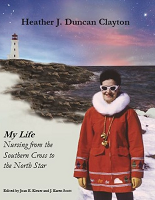Foreword

This book is a celebration of a magnificent woman’s life journey. From her early years living on lighthouse stations in Australia and later training as a nurse and midwife in the city of Sydney, Heather Clayton has lived a life filled with passion and adventure that few could imagine. Upon her arrival in Canada, Heather travelled to the frozen world of the Inuit in Sanikiluaq located in the Qikiqtaaluk Region of Nunavut, before continuing on to work with Indigenous communities across northern Canada for the remainder of her nursing career.
As the Executive Director of the Alberta Indian Health Care Commission, I first met Heather in 1981 while attending a meeting at Medical Services Branch. She was the Alberta Regional Nursing Officer, and her clear vision and no-nonsense approach to Indigenous health and wellness immediately captured my interest.
The Alberta Indian Health Care Commission was charged with the responsibility of transferring health services from federal to local control, and Heather was seconded as Senior Consultant to assist in the transfer process. She brought a wealth of experience to our team―as a researcher, administrator, nurse, midwife and a woman with heart.
Over time, Heather and I travelled to forty-two First Nations communities across Alberta to facilitate the formation of local health committees and regional boards of health, as well as the development of five demonstration projects and a variety of health-related research studies. While working in northern Cree communities with Elders Eddie Bellerose from Driftpile Cree Nation and Joe and Jenny Cardinal from Saddle Lake Cree Nation, I realized the deep reverence Heather held for Indigenous language, customs and culture was a living part of her worldview and essential in our work with Alberta First Nations.
The many hours we shared working with communities also provided a unique glimpse into the complex life experiences of a woman I came to admire and respect. At one point, we arrived in a semi-isolated community and spent the morning setting up the hall, organizing a luncheon and preparing for a gathering that would culminate in the formation of a local health committee. It didn’t, however, turn out the way we planned.
No sooner had we started than an elderly woman identified herself as the Community Health Representative and announced that they didn’t want to hear about health committees, but instead needed to know how to deliver a baby in the back seat of a car. We listened to the circumstances surrounding their request and without hesitation, Heather said, “No problem, I need a cardboard box, string, scissors and a doll,” then proceeded to conduct an evening-long session on how to deliver a baby in an emergency situation. In that moment, I knew I was working alongside a woman who truly understood participant-driven community development.
Heather’s lesson could also be very focused. One January morning, while driving to a northern community, I stopped at the top of a steep, icy hill. Deferring to her experience navigating glare ice in -45°F weather conditions, I turned and asked Heather for advice. She smiled and said, “Get out and empty your bladder,” then went on to explain the potential for traumatic injury of the bladder and urethra in a vehicle accident. Her common-sense approach has always been a reminder that wisdom comes in many forms.
As a woman whose courage is consistent with her most valued ideals, Heather’s dedication as a caring and gifted professional is the synthesis of deep truths that reside in many different cultures. In addition, her devotion as a mother and grandmother has demonstrated the value of unending patience and sacrifice for family, while her facility as a gifted artist and writer has imparted important lessons about never setting limits on oneself or others.
Today I am grateful for the knowledge granted by a spirit-filled teacher. As Heather and I move into the latter years of our lives, I am eager to embrace new lessons that await me on our shared journey.
Of Indigenous ancestry, Ms. Martell is a member of Sîkîp Sâkahikan First Nation. Certified in the field of addictions, she has utilized a traditional model of learning to facilitate First Nation wellness in Canada and the United States for the past 40 years. As a Clinical Associate with the Occupational Performance Analysis Unit (OPAU), Department of Occupational Therapy, University of Alberta (1996 to present), Rebecca also collaborates on a variety of First Nation health projects.